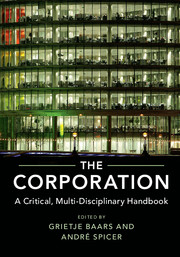Book contents
- Frontmatter
- Contents
- List of Contributors
- Acknowledgements
- Introduction: Why the Corporation?
- PART I DISCIPLINARY OVERVIEWS
- PART II INTERDISCIPLINARY THEMATIC CHAPTERS
- 1 The Evolution of the Corporate Form
- 2 The Multinational Corporate Group
- 3 The Financialization of the Corporation
- 4 Corporate Value Chains
- 5 Corporate Citizenship
- 6 The Corporation and Crime
- 7 The Corporation and Ideology
- 8 Corporation and Communities
- a Articulating and Disarticulating Corporation and Community
- b Communities Inside and Outside the Corporation: Control, Power and Interests
- c Coercion and Corporate Power: Notes on Class Struggle in an Indian City
- 9 Corporations and Resistance
- 10 Alternatives to the Corporation
- Index
- References
a - Articulating and Disarticulating Corporation and Community
from 8 - Corporation and Communities
Published online by Cambridge University Press: 31 March 2017
- Frontmatter
- Contents
- List of Contributors
- Acknowledgements
- Introduction: Why the Corporation?
- PART I DISCIPLINARY OVERVIEWS
- PART II INTERDISCIPLINARY THEMATIC CHAPTERS
- 1 The Evolution of the Corporate Form
- 2 The Multinational Corporate Group
- 3 The Financialization of the Corporation
- 4 Corporate Value Chains
- 5 Corporate Citizenship
- 6 The Corporation and Crime
- 7 The Corporation and Ideology
- 8 Corporation and Communities
- a Articulating and Disarticulating Corporation and Community
- b Communities Inside and Outside the Corporation: Control, Power and Interests
- c Coercion and Corporate Power: Notes on Class Struggle in an Indian City
- 9 Corporations and Resistance
- 10 Alternatives to the Corporation
- Index
- References
Summary
A recent review of ethnographic research on modern business corporations draws an axial distinction between two scholarly approaches, one ‘from the inside, as if corporations were analogous to the small-scale societies anthropologists traditionally studied’, and the other ‘from the outside, as actors affecting and transforming the world’.
From the former perspective, corporations have distinctive internal cultures consisting of values, beliefs, stories, rituals, etc. From the latter, they are powerful agents, impacting the lives of those who work for them (or invest in them), the local communities in which they operate, and the broader environment.
(Urban and Koh, 2013: 140)Urban and Koh call for the discipline of anthropology to advance its theorization of the corporation by bringing these two perspectives, ‘corporate inner workings’ and ‘corporate effects’, into dialogue with one another. A growing number of ethnographies, however, have been subverting the very notion that a clear and bright boundary separates corporations from their exterior environments. Drawing on this work and my own study of mining and the corporate social responsibility industry, I argue that everyday social processes of defining ‘corporations’ and ‘communities’ in relation to one another provide scholars with an important window onto the porous and contested nature of the corporation. Seeking to trouble the distinction drawn by Urban and Koh, I begin by taking a critical look at the ‘corporate effects’ model and then turn to the corporate ‘inner workings’ model.
The Community: Affected by Corporations or the Effect of Corporations?
Urban and Koh (2013: 143) depict the 1970s and 1980s as the heyday of ‘corporate effects’ research, when anthropologists adopting political economy approaches inspired by Marx ‘began to document the harmful impact transnational corporations were having on local communities’. From this perspective, people are constituted as ‘local communities’ by virtue of their geographic proximity to capitalist projects. This academic invocation of community dovetails with generic uses of the term in industry, activist and popular speech. It also carries normative assumptions and affective power.
- Type
- Chapter
- Information
- The CorporationA Critical, Multi-Disciplinary Handbook, pp. 449 - 456Publisher: Cambridge University PressPrint publication year: 2017



